The new IATI Validator is open for public testing
Cross posting from our Data4Development news:
With the start of public testing of the new IATI Validator, we like to briefly look back at how we got here, and our vision for the future.
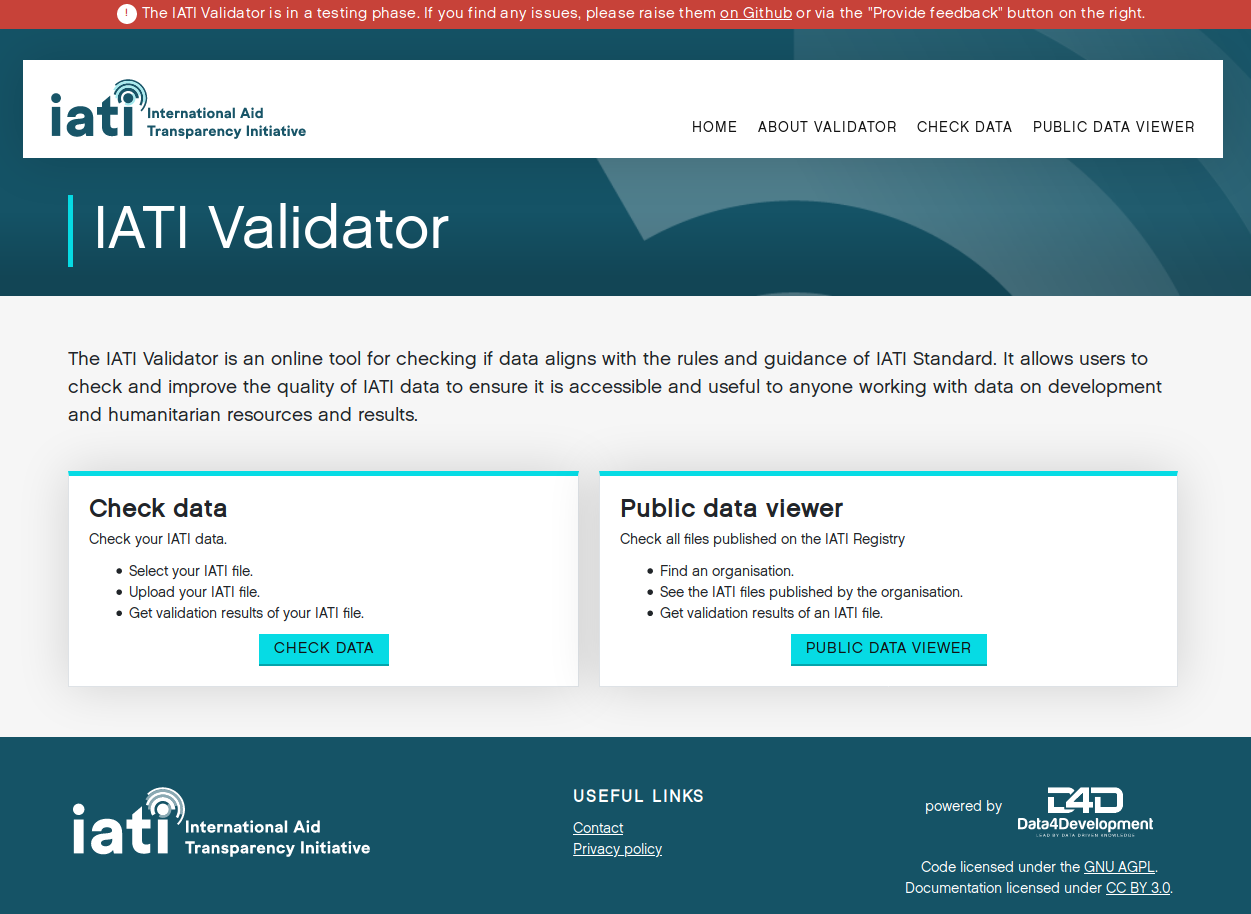
Cross posting from our Data4Development news:
With the start of public testing of the new IATI Validator, we like to briefly look back at how we got here, and our vision for the future.

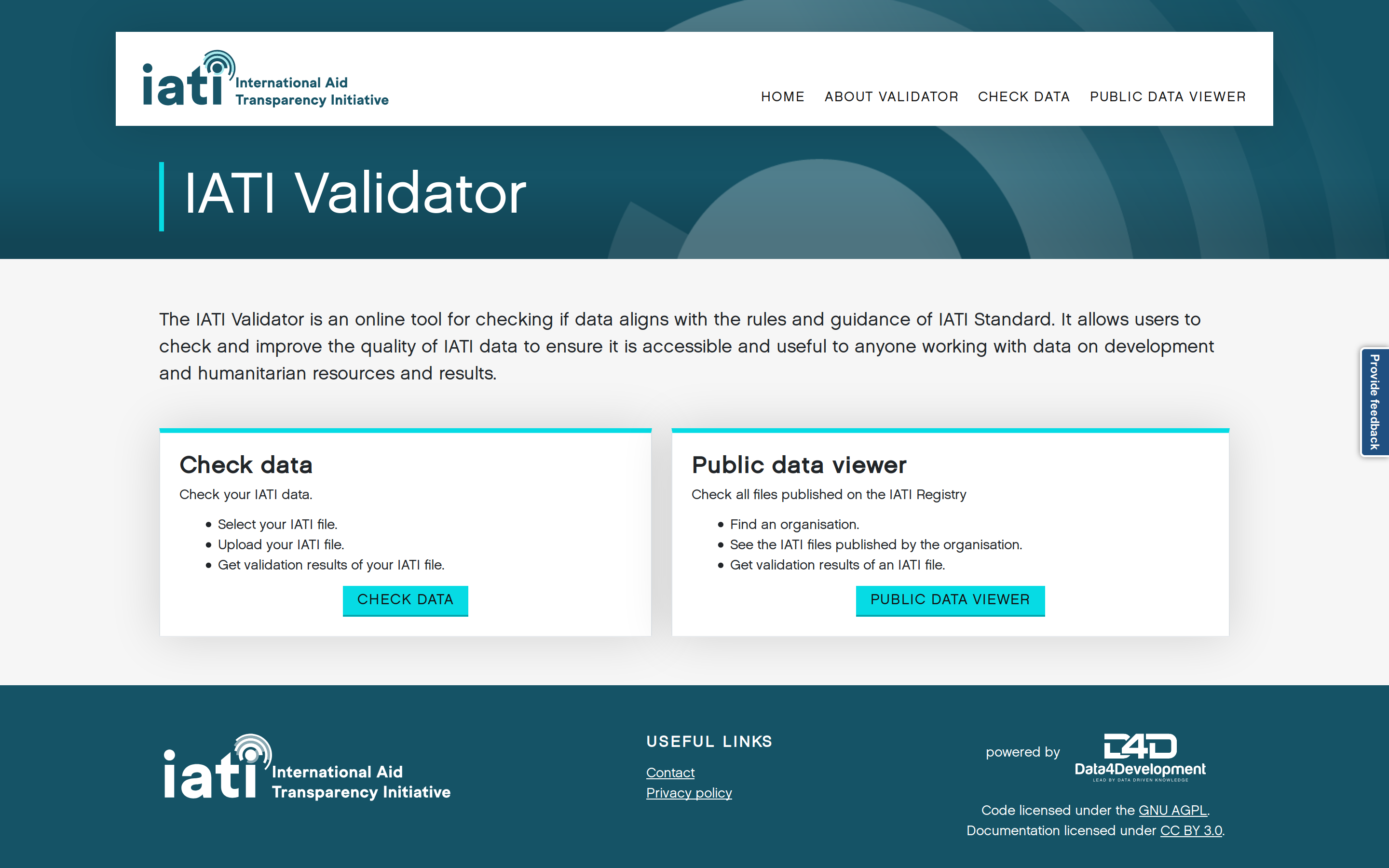
While I was on holidays, my colleagues wrote a little announcement at the Data4Development site to accompany the update by the IATI Secretariat about our work:
[Originally posted by Jesse Burns at the Data4Development website]
The last few months, Data4Development, especially Rolf Kleef, has been working on IATI’s new official Data Validator. In the fall, the new validator will finally launch and help organisations check the quality of their IATI publications more easily!
For completeness, I copied my post from the Data4Development site:

The State of Open Data (Davies et al., 2019)1 is an extensive report about “all things open data”. Chapter 5 deals with open data for development assistance and humanitarian action, and highlights the crucial chicken-and-egg problem we see as well:
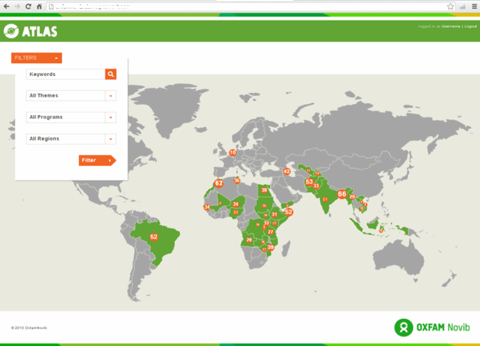

Today, Oxfam Novib went public with their Atlas project browser and open data.
Various people in the Open for Change network have been working with Oxfam Novib for a while now, helping to explore the potential of “open” and to transform the organisation towards “open”. The starting point was “open data”, but Oxfam Novib didn’t focus on just the technical side of things: they wanted to embed “open” more deeply into the way they worked.
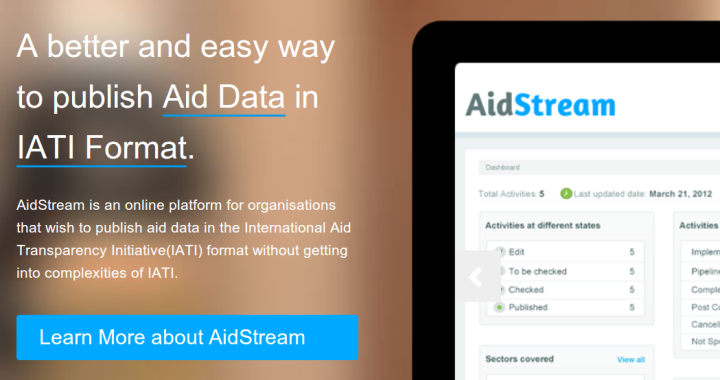
A month ago, on April 8th, I helped a group of Dutch NGOs get to grips with AidStream, as part of the Partos IATI programme. As always, it’s very informative to see unsuspecting users try to make sense of a new tool. It resulted in a list of observations, often easy fixes, that can make life a little easier or more pleasant.
 That same week, the AidStream code base was published on Github, and I had a chance to participate in the team check-in, and report a bunch of these observations as issues.
We’re hardly a month later, and I’m glad to see a steady flow of notifications of issues being closed:
That same week, the AidStream code base was published on Github, and I had a chance to participate in the team check-in, and report a bunch of these observations as issues.
We’re hardly a month later, and I’m glad to see a steady flow of notifications of issues being closed:
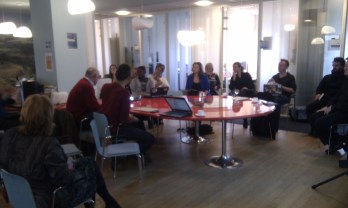

We’ve organised another Open Tea, last Friday at the Vrije Universiteit, with updates, two presentations, and networking drinks, kindly hosted by CIS-VU, the Centre for International Cooperation at the VU University in Amsterdam.
Victor de Boer and Anna Bon helped make this possible, and Victor wrote a blog post about it. And Araz Najarian of Connective Age wrote up a summary of the presentations, including a link to a with co-presenter Nana Baah Gyan video demonstrating RadioMarché.
A few weeks ago, in September, the Open Knowledge Festival brought together a world-wide community of people working on all sorts of “open”: open cities, open design, open government, open science, open hardware, open education, … and of course: open development.
As one of the main topic streams, the open development track was packed with presentations, discussions, panels, workshops and a hackathon.
.
Here’s a short summary by various key voices:
chevron_left Schneier on Security: The Importance of Security Engineering
Twitter puts the bird in a cage chevron_right
Announing a new publication: “An Information Platform for Business Intelligence in the Aid Sector based on Open Data and Documents; Integrated Access to structured and unstructured data using the document-oriented database CouchDB”, by Michiel Kuijper.
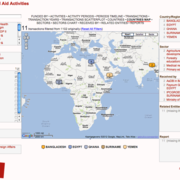 Earlier this year, I was approached by Michiel Kuijper, who was working on his Bachelor degree at the Amsterdam University of Applied Sciences, and was looking for a project to combine Business Intelligence and text mining. Together, we started exploring how to apply this in the development aid sector.
Earlier this year, I was approached by Michiel Kuijper, who was working on his Bachelor degree at the Amsterdam University of Applied Sciences, and was looking for a project to combine Business Intelligence and text mining. Together, we started exploring how to apply this in the development aid sector.
In this newsletter:
On December the 8th the Open for Change network had its first Open Tea at the Amlab in Amterdam, to look back at the past year and discuss where we will be heading in 2012.
Mark Tiele Westra from Akvo presented openaid.nl, an initiative that makes open data on Dutch development aid visualized and searchable.
Marijn Rijken from TNO informed and invited us to participate on a research project on the effects of open data for the development sector.
We discussed the organization of the Open for Change network. Evident in the discussion was the important role the Open for Change network holds in connecting, exchanging and supporting open data initiatives and knowledge in the development sector. How this role should be filled in is something we are working on in 2012.
We want to thank the 1%CLUB, Akvo and TextToChange for hosting the open tea in the gorgeous Amlab, and hope to see you there again at the next Open Tea: March 8th, 15:00- 17:00 and after that Open drinks!
At various meet-ups at conferences in 2011, we discussed ways to strengthen the international network of open aid data activists.
In November, we submitted a proposal for a European Aid Data Network to the EuropeAid budget line of the European Commission, led by AidInfo in the UK, with Partos (NL), FORS (CZ), ACEP (PT), IGO (PL) and the Open Knowledge Foundation (UK). We hope to hear by early March whether we are invited to submit a full proposal.
In the meantime, AidInfo has asked Claudia Schwegmann of OpenAid.de to continue building out this emerging European network. We had a first conference call last Tuesday, and plan to have the next one on March 2nd.
To create joint channels of communication, we invite you all to:
The IATI NGO Working Group is a CSO-led forum that was created with the approval of the IATI Steering Committee to discuss the application of the IATI Standards to the work of CSOs and to present practical proposals on CSO-specific approaches to publication of IATI compatible data.
The CSO Working Group is co-chaired by Beris Gwynne, representing the International NGO Charter of Accountability Company, and Brian Tomlinson, representing the CSO Open Forum.
Both Partos and Open for Change are represented in the group, and we’re aiming to organise an “intervision meeting” for Dutch NGOs in March.
The next peer reference meeting is planned for beginning of March. The first general consultation will hopefully take place in April 2012. Read more on our blog!
If you want to bring in subjects or interesting news for next newsletter, you are more than welcome: send your contributions to info@openforchange.info

The current discussion around open data often boils down to releasing data sets, and seeing nice visualisations and apps. But lets not forget that the full phrase is linked open data. The real power comes from linking the data. This week, the Open Government Data Camp in Warsaw lets us explore this more.
Just as web pages today link to other pages for further information, the data sets of tomorrow will link to other data sets, for more data. Your browser will help you navigate the data space.
The BBC is ahead in this game, and working on a “Digitial Public Space” project, linking together many sources of cultural data. Jake Berger writes on the BBC blog:
Early versions of this data model indicate that – as hoped – there will be many, varied and often unexpected journeys that can be made through these catalogues and the material they describe. For example, a user starting out by watching a film of a production of Macbeth from the Royal Opera House might then look at a scan of a rare musical manuscript from The National Archives, then browse similar manuscript scans held at the British Library, watch a clip from a BBC documentary about how paper was produced in Shakespeare’s era, before ending up learning about the plants used to make the paper using information from The Royal Botanic Gardens At Kew. In a [Digital Public Space], all of this could happen in the same online space.
That may still sound a bit like the current web of pages. Except: the publishers only provide standardised links for “Shakespeare”, “paper”, etcetera, and your browser makes the connections to offer you ways to move forward:
Mo blogged about the development of a web browser-based user interface, which navigates through these catalogues using the concepts of “people”, “places”, “events”, “things” and “collections”.
In international development aid, the IATI standard is an effort to work towards a similar “digital public space” in which you can navigate through “organisations”, “activities” and “results”.
An important part of establishing that space is to work towards joint standardised identifiers. At our ODDC conference in May, David Pidsley’s Virtual Workshop on Linking Development Data was focused on that, and next weekend, Tim Davies is organising an Organisation Identifiers Workshop as a fringe event for the Open Government Data Camp, in Warsaw, to continue working on this. And we’ll have more general Open Data for Development: Open Space session on Saturday morning.